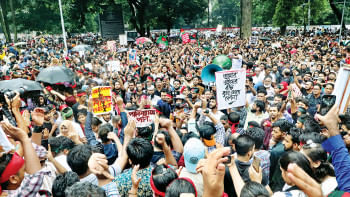Reclaiming judicial independence and the struggle for justice

The upheaval of July remains etched in our national memory. Though months have passed, the struggle continues to resonate, demanding that we hold ourselves accountable to those who gave their lives for justice. What began as a student-led movement calling for the abolition of the quota system in government jobs quickly transformed into a broader demand for fairness across all sectors of society, where systemic discrimination persists. The core demand was simple yet profound: justice for all, regardless of background or affiliation.
At the heart of this struggle lies the question of justice, and no institution bears greater responsibility in delivering it than the judiciary. However, over the past decade and a half, we have witnessed a gradual erosion of the judiciary's independence. From endorsing the abrogation of the caretaker government to approving laws like the Digital Security Act, or turning a blind eye to financial crimes, the judiciary has often deferred to the executive rather than acting as an independent arbiter of justice. To restore faith in this institution, it is essential to address both judicial reform and the reestablishment of its independence, guided by constitutional provisions.
The independence of the judiciary cannot be viewed in isolation; it is fundamentally tied to the health of democracy. True democracy, after all, is not just majority rule but a system that protects the rights of all, including minorities. In this sense, the judiciary must serve as a counter-majoritarian institution, ensuring that the voices of the few, who may hold the truth, are not drowned out by the clamor of the majority. Without democracy, judicial independence becomes a façade—there can be no independent judiciary in a nation where democratic principles are systematically eroded.
This idea finds its roots in our constitution. Article 7 emphasises the supremacy of the constitution and Article 7(A) makes any attempt to subvert or repeal its provisions, especially through extra-constitutional means, an act of sedition. This provision, in its essence, safeguards the judiciary's role as the ultimate protector of constitutional rights, standing firm against government overreach.
The path to judicial reform is challenging, but not without guidance. The landmark 1999 Masdar Hossain case (Secretary, Ministry of Finance vs. Masdar Hossain) laid out a 12-point directive aimed at ensuring judicial independence. These directives called for the separation of the judiciary from the executive, administrative control of subordinate courts by the Supreme Court, the creation of a separate judicial pay scale, and the establishment of a Judicial Service Commission. Yet, more than two decades later, many of these directives remain unimplemented, a testament to the executive's reluctance to relinquish control.
Articles 115 and 116 of the constitution pertain to the appointment, control, and discipline of subordinate courts, a long-standing issue. Although the 1972 constitution vested control of the judicial service in the Supreme Court, Article 116 currently grants the president—effectively the executive—control over the appointments, promotions, and postings of judges. Similarly, Article 95(1), which governs the appointment of judges of the Supreme Court, places undue power in the hands of the president, and ultimately, in the hands of the prime minister as per Article 48(3), despite the requirement for consultation with the chief justice. This is a blatant violation of the judiciary's independence. These imbalances are further compounded by Article 49, which grants the president the prerogative to grant mercy, even after a final conviction by the Supreme Court.
To truly achieve judicial independence, it is imperative to restore the original intent of the 1972 constitution. Article 116 should be implemented in its entirety, vesting the power of judicial appointments, promotions, and disciplinary measures in the Supreme Court, free from executive interference. A separate secretariat under the guidance of the Supreme Court should be established to handle administrative matters, further ensuring the judiciary's independence.
But, empowering the judiciary alone is not enough. Safeguards must be in place to prevent the Supreme Court itself from becoming a fascistic institution. Transparent mechanisms for the appointment and removal of judges, both in the High Court and Appellate Divisions, are crucial. The introduction of a Collegium system—where a panel of senior judges oversees appointments, removals, and all other judicial affairs—can serve as a safeguard against undue influence from the executive or legislature. Additionally, factors such as ethical conduct, educational background, and diversity should be prioritised in judicial recruitment.
The Fifth Amendment, despite being largely abolished, has left lingering provisions that must be re-evaluated to safeguard judicial impartiality. Article 99(1), which allows retired judges to hold other offices of profit in the Republic, and Article 99(2), which permits retired High Court judges to practice before the Appellate Division, could compromise the integrity of the judiciary.
Governments will always attempt to manipulate the system in their favour, often at the expense of democratic principles. But concentrating power in a single institution, whether the executive, legislature, or judiciary, is detrimental to democracy. A balanced distribution of power is essential for a healthy democratic framework. Article 70, which restricts MPs from voting against their party, must either be repealed or reformed to allow for more accountability within the legislature.
The judiciary must be able to act as a counter-majoritarian institution, standing firm even when its decisions go against popular opinion. While democracy inherently seeks to represent the majority, it is the judiciary's duty to uphold the truth and protect minority rights. The court must have the courage to resist mobocracy and uphold justice, even when it contradicts the majority's will. Furthermore, the exclusion of the judiciary from the definition of the "State" in Article 152 should be addressed to reinforce the judiciary's independent role. While the legislative and executive branches represent the majority, the judiciary must remain distinct, impartial, and immune to political influence.
The independence of the judiciary is not merely a constitutional issue—it is essential to the preservation of democracy in Bangladesh. Without it, justice remains elusive, and the rights of the people remain vulnerable to executive overreach. To reform the judiciary is to take a step towards realising the full promise of our constitution—a promise of equality, justice, and fairness for all.
As we contemplate these reforms, we must remember that challenging the status quo may invite accusations of sedition as per Article 7(A). But if we are to build a more just and democratic future for Bangladesh, we must critically reassess our constitutional framework and strive for a judiciary that is not only independent but also a true defender of the people's rights.
Snehadri Chakravarty is advocate at the Supreme Court of Bangladesh. He can be reached at:[email protected].
Views expressed in this article are the author's own.
Follow The Daily Star Opinion on Facebook for the latest opinions, commentaries and analyses by experts and professionals. To contribute your article or letter to The Daily Star Opinion, see our guidelines for submission.

 For all latest news, follow The Daily Star's Google News channel.
For all latest news, follow The Daily Star's Google News channel. 










Comments